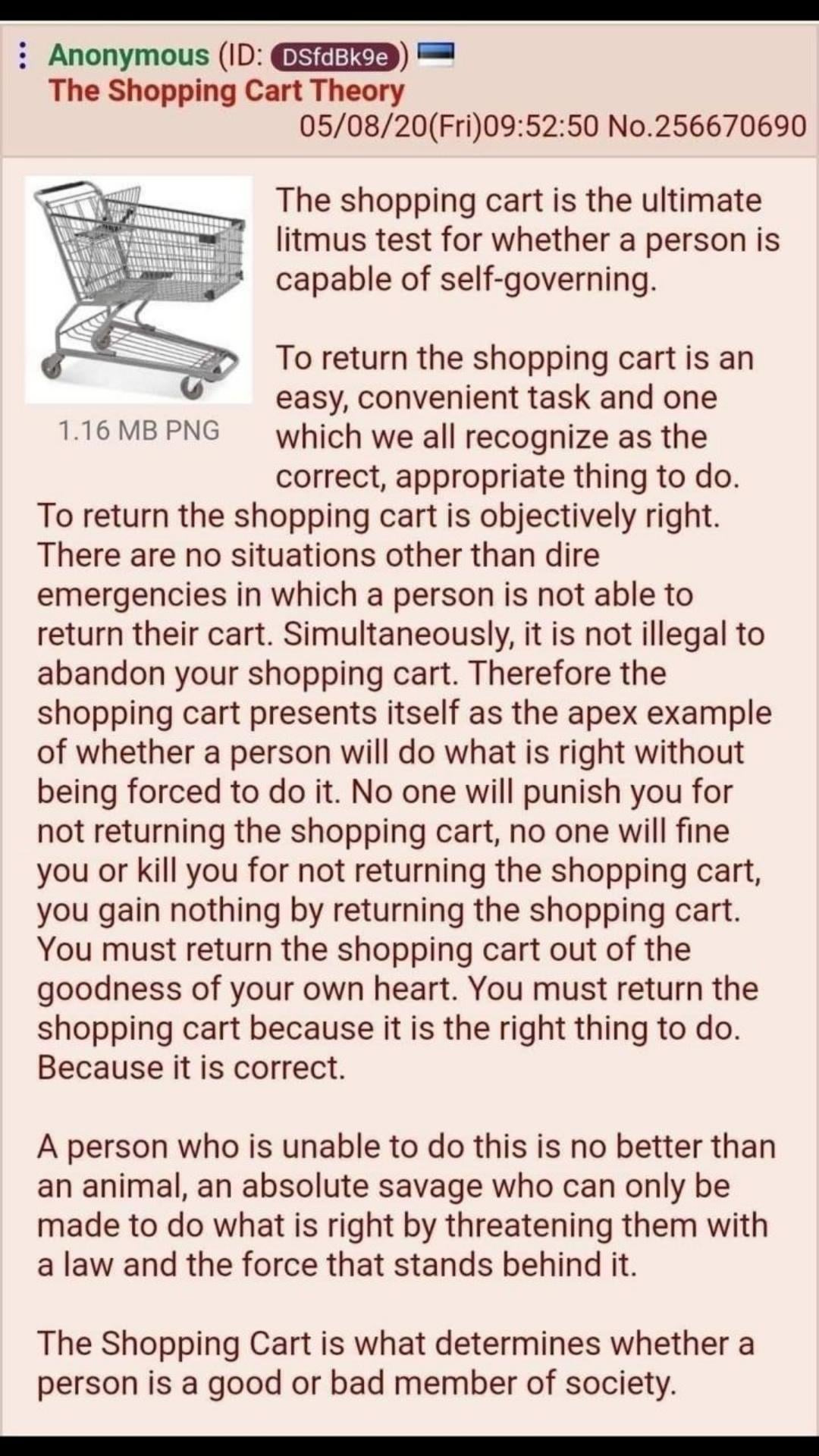Don't Ignore It
Even when you want to look away
I always get a kick when this meme, originally popularized in 2020, makes its way onto my social media feed. Not returning the shopping cart is one of my greater gripes and I love seeing it mocked, despite the tone of the meme being a bit hyperbolic. After all, there are plenty of legitimate reasons one could come up with for not returning the shopping cart. But the truth of it is, in a normal circumstance, whether or not you return the cart is telling. Differing with the language of the meme, I actually do think you gain something by returning the cart.
That has to do with the power behind returning things. I was inspired by my sister in writing this post. Earlier this week, she shared a charge to my nephew at his bar mitzvah highlighting the following set of verses from this week’s portion. In Devarim 22:1-4, we read:
If you see your fellow Israelite’s ox or sheep gone astray, do not ignore it; you must take it back to your peer.
If your fellow Israelite does not live near you or you do not know who [the owner] is, you shall bring it home and it shall remain with you until your peer claims it; then you shall give it back.
You shall do the same with that person’s ass; you shall do the same with that person’s garment; and so too shall you do with anything that your fellow Israelite loses and you find: you must not ignore it.
If you see your fellow Israelite’s ass or ox fallen on the road, do not ignore it; you must raise it together.
It’s a set of verses I have looked at many times. In fact, we read a similar directive way back in Exodus to return a lost animal. But here, there is an addition to the text, the bolded phrase of not ignoring it. Why, my sister wondered, is the Torah so intent on repeating that phrase? Her questioning had me wondering.
A simple answer is that our natural inclination leads us to gloss over when we see a lost object. Not my monkeys; not my circus. A deeper theory could be that we’re simply too caught up in our own lives to be bothered by someone’s else problems. Our lives are filled with too much chaos, too much strife, too much too much-ness, so we ignore things. And in steps the Torah to say you may want to ignore it and you may fall prey to ignoring it much of the time but aspire to do better.
Adding another powerful layer to this is one of our favorites here on this blog, the Sfat Emet, of the Gerrer chasidic dynasty:
Sefat Emet, Deuteronomy, Ki Teitzei 8:3
The pasuk states, “If you see your fellow’s ass or ox fallen on the road, do not ignore it; you must raise it together.” This teaches that when a person trains themselves to not ignore the losses or struggles of others, whether physical or spiritual, they develop the strength to help recover what was lost or lift the burden. This applies even more to one's own shortcomings; when one cannot tolerate their own flaws, they will be motivated to overcome them and be saved.
The repetition here, in his eyes, is meant to push us to develop a muscle within ourselves, a muscle that we either let atrophy or which naturally does so, to pay attention to what’s happening with those around us. It doesn’t matter, he argues, whether it’s a physical loss or a mental loss. Don’t look away from the deficits people are experiencing.
To be in the world and to be in real relationships is to note what’s happening with those around us and help them carry their burden. It’s a potent combination. I see you experiencing a loss or overcome with a burden and together, we can get through it.
But then, he adds one more powerful element. When we develop that practice, it also does something to our own work. Namely, when I start to not ignore the lost objects of others, I begin to recognize the loss I feel within myself. Where have I become overburdened by a load? What have I lost recently? It both signals to others that I need their help and reminds me that I have strength to do hard things.
The Sfat Emet has taken something fairly surface level and turned it into a reflection on the depth of the human experience, much like whether or not someone returns a shopping cart. This is what’s different from the meme. We gain an awareness when we return things like the shopping cart. It broadens our perspective. Every person around us has lost something. Sometimes those things are obvious to the eye and sometimes they’re more hidden. However they manifest, our role in this uniquely messy web of humanity is to train ourselves to not ignore it.
When those lights start flashing, we need to remind ourselves to step up, not away. Perhaps when we do it, it can also remind us of the help we might need and the power we might already wield in helping ourselves.
Shabbat Shalom and Happy Weekend!


Rabbi sibling synergy is my favorite kind of synergy
As always, insightful! I think, once again, it comes down to, what would I want someone to do if the situation was reversed. Do unto others…..
To most of us, it just feels good to do the right thing! Shabbat Shalom and Hugs and Love! ❤️